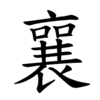襄
See also: 㐮
| ||||||||
Translingual
| Stroke order | |||
|---|---|---|---|
 | |||
Han character
襄 (Kangxi radical 145, 衣+11, 17 strokes, cangjie input 卜口口女 (YRRV), four-corner 00732, composition ⿳亠⿱吅𠀎𧘇)
Derived characters
Descendants
References
- KangXi: page 1123, character 31
- Dai Kanwa Jiten: character 34556
- Dae Jaweon: page 1591, character 20
- Hanyu Da Zidian (first edition): volume 5, page 3109, character 12
- Unihan data for U+8944
Chinese
| simp. and trad. |
襄 | |
|---|---|---|
| alternative forms | 㐮 勷 to accomplish | |
Glyph origin
| Historical forms of the character 襄 | |||||
|---|---|---|---|---|---|
| Shang | Western Zhou | Warring States | Shuowen Jiezi (compiled in Han) | Liushutong (compiled in Ming) | |
| Oracle bone script | Bronze inscriptions | Bronze inscriptions | Chu slip and silk script | Small seal script | Transcribed ancient scripts |
 |
 |
 |
 |
 |
 |
Characters in the same phonetic series (襄) (Zhengzhang, 2003)
| Old Chinese | |
|---|---|
| 囊 | *naːŋ |
| 蠰 | *naːŋ, *sraŋ, *hnjaŋs, *njaŋʔ |
| 曩 | *naːŋʔ |
| 灢 | *naːŋʔ, *naːŋs |
| 儾 | *naːŋs |
| 孃 | *naŋ, *njaŋ |
| 瓤 | *naŋ, *njaŋ |
| 鑲 | *naŋ, *njaŋ |
| 釀 | *naŋs |
| 瓖 | *snaŋ, *snaŋ |
| 驤 | *snaŋ |
| 襄 | *snaŋ |
| 纕 | *snaŋ |
| 忀 | *snaŋ |
| 欀 | *snaŋ, *njaŋs |
| 饟 | *hnjaŋ, *hnjaŋʔ, *hnjaŋs |
| 攘 | *njaŋ, *njaŋʔ, *njaŋs |
| 禳 | *njaŋ |
| 穰 | *njaŋ, *njaŋʔ |
| 躟 | *njaŋ, *njaŋʔ |
| 瀼 | *njaŋ |
| 獽 | *njaŋ |
| 儴 | *njaŋ |
| 蘘 | *njaŋ |
| 鬤 | *njaŋ, *rnaːŋ |
| 勷 | *njaŋ |
| 壤 | *njaŋʔ |
| 嚷 | *njaŋʔ |
| 讓 | *njaŋs |
| 懹 | *njaŋs |
| 攮 | *rnoːŋʔ |
Etymology
- “to remove”
- From *s- (“causative”) + 攘 (OC *naŋ, “to steal; to expel”) (Schuessler, 2007; Baxter and Sagart, 2014).
Pronunciation
Definitions
襄
- (literary) to aid; to help; to assist
- (literary) to accomplish; to achieve; to complete
- (literary) to remove
- 牆有茨,不可襄也。 [Pre-Classical Chinese, trad.]
- From: The Classic of Poetry, c. 11th – 7th centuries BCE, translated based on James Legge's version
- Qiáng yǒu cí, bùkě xiāng yě. [Pinyin]
- The tribulus grow on the wall,
And cannot be removed.
墙有茨,不可襄也。 [Pre-Classical Chinese, simp.]
- (literary) to raise up; to ascend over
- (literary) tall; high
- Alternative form of 驤/骧 (xiāng).
- Alternative form of 攘 (ráng).
- a surname
Compounds
Japanese
Korean
Vietnamese
This article is issued from Wiktionary. The text is licensed under Creative Commons - Attribution - Sharealike. Additional terms may apply for the media files.